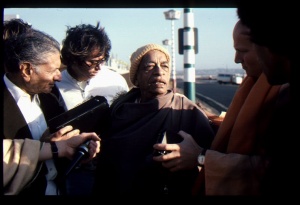SB 10.48.6

A.C. Bhaktivedanta Swami Prabhupada
TEXT 6
āhūya kāntāṁ nava-saṅgama-hriyā
viśaṅkitāṁ kaṅkaṇa-bhūṣite kare
pragṛhya śayyām adhiveśya rāmayā
reme 'nulepārpaṇa-puṇya-leśayā
SYNONYMS
āhūya—calling forward; kāntām—His beloved; nava—new; saṅgama—of contact; hriyā—with shyness; viśaṅkitām—fearful; kaṅkaṇa—with bangles; bhūṣite—ornamented; kare—her two hands; pragṛhya—taking hold of; śayyām—on the bed; adhiveśya—placing her; rāmayā—with the beautiful girl; reme—He enjoyed; anulepa—of ointment; arpaṇa—the offering; puṇya—of piety; leśayā—whose single trace.
TRANSLATION
Calling forward His beloved, who was anxious and shy at the prospect of this new contact, the Lord pulled her by her bangled hands onto the bed. Thus He enjoyed with that beautiful girl, whose only trace of piety was her having offered ointment to the Lord.
PURPORT
Śrīla Viśvanātha Cakravartī explains that the words nava-saṅgama-hriyā indicate that Trivakrā was in fact a virgin girl at this point. She had been a deformed hunchback, and the Lord had recently transformed her into a beautiful girl. Therefore, although clearly lusting after Śrī Kṛṣṇa, she was naturally shy and anxious.